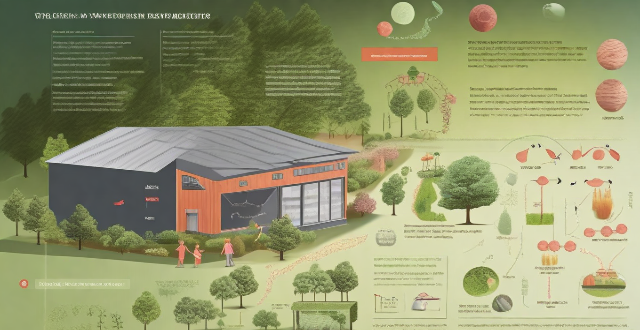In this article, we explore the natural and human-intensified causes of the greenhouse effect and its potential consequences. The greenhouse effect is a process where certain atmospheric gases trap heat from the sun, warming the Earth's surface. Human activities such as burning fossil fuels, deforestation, and agricultural practices have increased the levels of these gases, leading to an intensified greenhouse effect and contributing to global warming. The consequences of an intensified greenhouse effect include rising temperatures, melting ice caps and glaciers, extreme weather events, ecosystem disruption, and impacts on human health. To address these challenges, collective action is needed to reduce greenhouse gas emissions and transition to sustainable practices.

The Greenhouse Effect: Causes and Consequences
The greenhouse effect is a natural process that warms the Earth's surface. However, human activities have been increasing the levels of certain gases in the atmosphere, which intensify this effect and contribute to global warming. In this article, we will explore the primary causes of the enhanced greenhouse effect and its potential consequences.
I. Natural Causes of the Greenhouse Effect
A. Solar Radiation Absorption by Earth
1. Sunlight Absorption: The sun emits energy in the form of visible light, ultraviolet radiation, and infrared radiation. When this solar radiation reaches Earth, some of it is absorbed by land, oceans, and clouds.
2. Re-emission as Infrared Radiation: The absorbed solar energy heats the Earth's surface, which then re-emits the energy as infrared radiation. This process is essential for maintaining a habitable temperature on Earth.
B. Atmospheric Gases Trap Heat
1. Greenhouse Gases: Certain atmospheric gases, such as carbon dioxide (CO2), methane (CH4), and water vapor (H2O), trap heat by absorbing infrared radiation emitted by the Earth's surface.
2. Natural Greenhouse Effect: Without these gases, Earth would be too cold to support life as we know it. This natural greenhouse effect is crucial for maintaining a stable climate.
II. Human Activities Intensifying the Greenhouse Effect
A. Burning Fossil Fuels
1. Carbon Dioxide Emissions: Burning coal, oil, and natural gas releases large amounts of CO2 into the atmosphere, increasing its concentration and enhancing the greenhouse effect.
2. Energy Production: Power plants are major sources of CO2 emissions, contributing significantly to the problem.
B. Deforestation
1. Loss of Carbon Sinks: Trees absorb CO2 from the atmosphere during photosynthesis. Deforestation reduces the number of trees available to perform this function.
2. Release of Stored Carbon: Cutting down forests also releases the carbon they have stored, adding to the atmospheric CO2 levels.
C. Agricultural Practices
1. Methane Emissions: Livestock farming produces methane, another potent greenhouse gas, through digestive processes.
2. Nitrogenous Fertilizers: These fertilizers can lead to the emission of nitrous oxide (N2O), a strong greenhouse gas with a long atmospheric lifetime.
D. Industrial Processes
1. Industrial Emissions: Manufacturing processes often release various greenhouse gases, including CO2 and CH4.
2. Refrigerants and Aerosols: Industrial chemicals like CFCs (chlorofluorocarbons) and HFCs (hydrofluorocarbons) are potent greenhouse gases and ozone-depleting substances.
E. Waste Management
1. Landfill Methane: Organic waste in landfills decomposes to produce methane, which escapes into the atmosphere.
2. Waste Incineration: Burning waste can release CO2 and other pollutants into the air.
III. Consequences of an Intensified Greenhouse Effect
A. Global Warming
1. Rising Temperatures: An enhanced greenhouse effect leads to higher global temperatures, affecting ecosystems and weather patterns.
2. Melting Ice Caps and Glaciers: Warmer temperatures cause ice caps and glaciers to melt, raising sea levels and threatening coastal communities.
B. Extreme Weather Events
1. Heatwaves and Droughts: Higher temperatures can lead to more frequent and severe heatwaves and droughts.
2. Storms and Floods: Changes in precipitation patterns can result in more intense storms and flooding events.
C. Ecosystem Disruption
1. Habitat Loss: Rising temperatures can alter ecosystems, leading to the loss of habitats for many species.
2. Species Extinction: Some organisms may not be able to adapt quickly enough to changing conditions, leading to extinction.
D. Human Health Impacts
1. Heat-Related Illnesses: More frequent heatwaves can increase the risk of heat stroke and other heat-related illnesses.
2. Air Quality Issues: Higher temperatures can exacerbate air pollution problems, affecting respiratory health.
In conclusion, while the greenhouse effect is a natural phenomenon essential for life on Earth, human activities have significantly amplified its effects. The consequences of an intensified greenhouse effect include global warming, extreme weather events, ecosystem disruption, and impacts on human health. Addressing these challenges requires collective action to reduce greenhouse gas emissions and transition to sustainable practices.